|
by James DeChene
I’m still amazed at how Amazon decided to pack its virtual bags and abandon plans to build a headquarters in NYC. Not only does it showcase the hoops that businesses go through to relocate and bring jobs and development to a city or region, it’s staggering when you compare cost of living to other areas across the country. Case in point comes from a WSJ opinion article (PDF version here) from a restauranteur who moved his business from California to Nashville. Comparing cost of living in Arlington (the site of the headquarters building Amazon will build) to NYC to Nashville shows that compared to living in Manhattan, a $150,000 salary there translates into a 51.8% increase in purchasing power in Arlington ($229K) and a whopping 171% increase in purchasing power in Tennessee, to the tune of almost $410,000. All of this circles back to places like Delaware. We have a ton going for us—low cost of living, urban, suburban, rural and beach lifestyle choices, regionally located to all the places you want to visit but may not want to live, and access to a talented workforce that’s getting better by the day. The story also reinforces messages that the State Chamber and other groups have been offering for years related to permits and places like Middletown that get that timing matters. As we’ve heard from site selectors, 6 months for permitting is the sweet spot to get noticed by companies looking to relocate. Efforts continue to track permit status, made easier by DELDOT and DNREC websites created to do just that, but more can and will be done to perfect the process. Companies, and their C-suites, should be looking at what happened in NYC with Amazon, and should be making decisions based on how they’ll be received by local communities. The fact remains that Delaware is a bargain, and by continuing to make strides in making us more attractive, we’re in a better position to compete.
0 Comments
Remarks by Paul Herdman, President & CEO, Rodel Foundation of Delaware
Good evening everyone. My name is Paul Herdman and I’m the president and CEO of the Rodel Foundation of Delaware. I also serve on the board of directors for The Partnership. I’m up here tonight to present the John H. Taylor, Jr. Education Leadership Award—named after someone who I knew and respected ever since I came to Delaware—to another longtime friend and mentor, John Hollis. John Taylor’s wife, Maria, and his son, John, are here with us today and helped us make this choice in partnership with the leadership of the Chamber and the Partnership, Inc board. In making this decision, we thought hard about the core attributes that John Taylor brought to his work. Two that stand out to me are, one, a deep and unwavering passion for kids, particularly those most in need, and two, integrity and universal respect from those on the front lines to the leaders of business and government. As our group began reviewing the amazing candidates for this award, John Hollis fit these attributes to a tee. For those of you in the audience who aren’t familiar with John Hollis’ body of work... In 1974, John was approached by some leaders at the Seaford Dupont nylon plant, which was the world’s first and largest (at the time) nylon plant. The bigwigs at Dupont wanted to tap into a national movement called the National Action Council for Minorities in Engineering group, and the folks at the Seaford plant wanted to participate. John at the time was coaching and teaching science for the sons and daughters of the Dupont engineers, who all thought they needed an educator to advise and motivate these students. So from relatively humble beginnings, MERIT was born, essentially as a science club aimed at local African American, Native American, and Latino children. MERIT stood for Minority Educational Regional Incentive Training. Their charge was clear: to help address the wide disparity between a roughly 25-percent local minority population, and the less than 1 percent of whom were matriculating into higher education in science and technical fields. Now, John knew from his years as a coach, counselor, and teacher that if we wanted to inspire these children to higher education and beyond, he needed to develop the whole child, not just host them in a science club. So John got to work utilizing his knowledge in motivational science to morph this science club into a total youth development program, helping countless young people with not only academic chops, but with motivation, goal-setting, time management, and more. John understood that all students have the potential for greatness. And that sometimes, what they needed most was a picture of what that greatness could look like. Hence the importance of setting goals, and understanding the steps needed to reach those goals. He did all this with an unflinching approach to STEM education (back before STEM was the buzzword it is now). MERIT kids were engaging in rigorous instruction met with fun activities that made science and engineering come alive. Stuff like engineering competitions with fighting robots or wind turbine design contests—often in partnerships with local employers. John once told us that he thinks about MERIT as a place where the rubber meets the road. In other words, he doesn’t operate in theoreticals, but in action. He preaches family involvement, community activation, mentorship. Not that he needs validation, but MERIT’s track record does just that. To date, 370 MERIT alumni have gone on to achieve a college degree, accounting for approximately 97% of its participants. Many return to volunteer, creating a strong alumni base, which has helped shape the evolution of the program. 14 MERIT students have gone onto Ivy League degrees. Around 30 have doctorates. In addition to all his work with MERIT, John’s been deeply involved with DelTech, the Delaware Community Foundation, the Western Sussex Boys and Girls Club, and Nemours. John has overseen MERIT for 42 years. And he’s done so through a lens of servant leadership and I know his faith has been foundational to how he approaches the work. Thanks to his guidance, hundreds of young people who needed a leg up have been inspired by his passion for engineering and math, and more. He has given his heart to the community and never asked for acknowledgement. I have every confidence that the namesake of this award, John H. Taylor, would have been honored to give him some of that recognition. Ladies and gentlemen, it’s my honor to present the John H. Taylor, Jr. Education Leadership Award—to John Hollis! by Mark DiMaio
Over 250 people attended the State Chamber’s annual Spring Legislative Conference & Manufacturing Brunch. This year’s conference, called “The Future Is Now: Reinventing Manufacturing in Delaware,” highlighted Delaware’s commitment to energizing its manufacturing base. "Manufacturing makes Delaware stronger," said Congresswoman Lisa Blunt Rochester during her opening remarks highlighting the importance of manufacturing in Delaware. The conference keynote speaker was lean manufacturing expert Gary Convis, formerly with the Toyota Motor Corporation and now a senior advisor at Bloom Energy. Mr. Convis brought the “Toyota Way,” a management and manufacturing approach that offered streamlined processes and leadership that is committed to continuous employment for its workforce. He spoke to the importance of developing leaders that create an environment that empowers their employees to stop a manufacturing production line if they detect a problem. Governor John Carney provided the brunch keynote speech focusing on working together in a bipartisan manner, like the creation of the public-private Delaware Prosperity Partnership to enhance Delaware’s high quality workforce. The Governor also highlighted the importance of a regulatory and tax environment that encourages manufacturers to grow and locate in Delaware. A special thank you to Dr. Mark Brainard for hosting the conference at Delaware Tech’s Del-One Conference Center. The State Chamber was excited to be present for the expansion ceremony of member, Adesis, on March 2, at their New Castle facility. The company, along with its Universal Display associates, hosted state and local officials, including Governor John Carney, Senator Tom Carper, the Delaware Prosperity Partnership, and other members of the community to celebrate the groundbreaking of its new state-of-the-art laboratories.
Adesis, Inc., is a contract research organization (CRO) supporting the pharmaceutical and biopharmaceutical industry, biomaterials, and catalysts industry. Adesis began operations in Delaware in 1991 and has grown in size, operations and employees, ever since. It was acquired in 2016 by Universal Display Corp., of Ewing, New Jersey. Adesis is housed on McCoullough Drive, and had been renting the space for about twenty years. Citing their investment in the building, Delaware's central location to its customers, and the number of employees who live near the facility, the decision to purchase the facility and stay in Delaware, was relatively easy to make. The company also announced this past December that it would join the entrepreneurial innovation community of the Delaware Innovation Space (DISI). Adesis signed an agreement with DISI for approximately 7,000 square feet of laboratory space at the Experimental Station in Wilmington, Delaware. The new suite of laboratories, which includes additional ancillary work and meeting space, will augment Adesis’ on-going operations at McCullough Drive. You can read the company press release about the expansion ceremony here. by Mark DiMaio
Last year we asked Chamber members to participate in a survey for input about obstacles to their business growth. We received nearly 100 individual responses to our question about specific suggestions on what Delaware should do to improve its economy. Listed below are four areas that respondents mentioned most often, along with ways the Chamber is working to advance Delaware’s economic health. Improve schools and infrastructure
Balance the state budget with new revenue sources and cut government spending
Encourage entrepreneurship and a diverse economy - strong business climate to attract new business
Streamline land use and permitting process – less regulation overall
By Mark DiMaio
In 2017, we invited Chamber members to participate in a survey in part to gauge their view of obstacles to their business growth. Listed below are the top five, along with ways the Chamber is addressing them. 1. Cost of Employee Health Care The Chamber recognizes the growing problem surrounding health care costs.
2. Lack of Qualified Applicants We are actively engaged, along with many of our members, with the Pathways to Prosperity program. Delaware Pathways programs are a set of curriculum focused on a specific industry-based “pathway,” paired with opportunities to gain workplace experience while still in high school, graduate with a head start on a college degree, or gain qualifications needed to go to work immediately. The program is a unique collaboration of school districts, businesses, higher education, and national advisory partners that represent a new way to do school. The Delaware Manufacturing Association (a Chamber affiliate) members have actively participated in the Manufacturing Engineering Technology and Manufacturing Production & Logistics pathways. Delaware Pathways will host its 4th Annual Conference on March 21. 3. Concerns with Crime & Safety The Chamber supports the efforts of elected officials and their staffs to reduce crime in Wilmington and across the state.
4. Concerns About Local Schools Improving education outcomes is a key factor in developing a skilled workforce and attracting new business to Delaware.
5. Cost of Permitting and Regulation Compliance
by Mark DiMaio
In 2017, we invited Chamber members to participate in a survey to gauge their view of Delaware's economic health, and provide input on policy priorities. Listed below are the top four, along with ways the Chamber is addressing them. 1. Economic Development The Chamber is dedicated to promoting an economic climate that strengthens the competitiveness of Delaware businesses and benefits citizens of the state.
2. Cost of Health Care The Chamber recognizes the growing problem surrounding health care costs.
3. Government Spending We will continue to advocate for structural changes to Delaware’s budget. Delaware needs fiscal policies that foster business growth and advance the state’s long-term economic future.
4. Education Reform (K-12) Improving education outcomes is a key factor in developing a skilled workforce and attracting new business to Delaware.
MANUFACTURING MATTERS: Adesis Grows Business and Expands Fundamental Chemistry Capabilities2/6/2018 Contributed by DSCC Member Adesis Adesis, Inc., a wholly-owned subsidiary of Universal Display Corporation (Nasdaq: OLED), today announced that it will open a new suite of state-of-the-art laboratories in Delaware and expand its organic chemistry team and R&D programs. This additional footprint is expected to help drive growth opportunities in areas including next-generation OLED (organic light emitting diode) emitter and host materials and meet the growing demand for the Company’s custom organic synthesis, research & development, and specialty manufacturing services. Adesis also announced that it became a sponsor of Delaware Innovation Space (DISI) and joined its entrepreneurial innovation community. Working with DISI, Adesis signed an agreement for approximately 7,000 square feet of laboratory space at the Experimental Station in Wilmington, Delaware. The new suite of laboratories, which includes additional ancillary work and meeting space, is expected to augment Adesis’ on-going operations and recently-purchased 47,500 square feet headquarter building in New Castle.
“Delaware is home to a number of great chemical and manufacturing companies like Adesis, who are committed to making a world-class product with a great local workforce,” said U.S. Senator Christopher Coons (D-Del.). “I am delighted to see Adesis and their parent company UDC grow in Delaware as they expand their market reach and product offerings to more users around the world.” “We are pleased to announce our expanding footprint and increased investment to further boost research, innovation and job opportunities in Delaware,” said Andrew Cottone, President of Adesis, Inc. “As a leading organic synthesis CRO (contract research organization), we are adding to and extending our discovery services and process development capacity for customers across the pharmaceutical, chemical, biomaterials, and catalysts industries. We are enhancing our productivity and effectiveness by streamlining the technology transfer and optimizing the workflow from basic research to specialty manufacturing. Furthermore, by co-locating in our New Castle headquarters and the Experimental Station, we believe that we are building a world-class technology and manufacturing hub to support our customers from innovation to commercialization.” “Adesis continues to invest in Delaware, and we are thrilled that the company will bring its long track record of innovation to the Delaware Innovation Space,” said Governor John Carney. “We partnered with DuPont and the University of Delaware to create the Innovation Space to foster growth of early-stage scientific-based companies, and encourage collaboration among Delaware’s most talented innovators. The addition of Adesis will support that mission, and we’re thankful for the company’s continued partnership.” This recent expansion by Adesis was rapidly enabled by the seamless cooperation of the Delaware government and business leaders who have fostered a robust scientific ecosystem. “The Delaware Innovation Space is pleased to be able to support the growing needs of Adesis and accelerate its business forward right here in Delaware,” said Bill Provine, CEO of the Delaware Innovation Space. “Adesis will be a great new member of our science-based innovation community, and we look forward to working with them to further capitalize on the strengths of our new entrepreneurial ecosystem.” Adesis has also been assisted by the newly formed Delaware Prosperity Partnership (DPP). The DPP was recently created by Delaware as a public/private partnership to accelerate economic development efforts. “It has been a pleasure working with Andrew Cottone and Adesis to help facilitate their Delaware expansion, both in New Castle and at the Delaware Innovation Space,” said John Riley, Interim CEO of the DPP. “This would have been difficult to accomplish had the State, DuPont, and the University of Delaware not set the foundation for success with the formation of the Delaware Innovation Space earlier this year.” by James DeChene
This week saw the confirmation of former DEDO director Cerron Cade to fill the vacant Secretary of Labor position. The Chamber looks forward to working with Secretary Cade in this new position on issues important to the business community. Also this week, HB106 was released from committee, which would add two additional personal income tax brackets at $125,000, with a rate of 7.10%, and an additional bracket of $250,000, with a rate of 7.85%. The State Chamber spoke against the bill, noting that it would add volatility to Delaware’s revenue collection at a time when efforts are being made to make Delaware less reliant on volatile sources of revenue. This reliance has an increasing deleterious impact on the State’s long-term sustainability. Governor Carney released his recommended budget, an increase of 3.49% over last year, which calls for increased spending on education, public safety and making investments in economic development and workforce development. It also includes an increase in the bond bill, along with $100 million in cash as one-time money for projects. Door openers, including class room growth, employee pensions, child care and transportation, were about $60 million in increases. It also includes: $12.5 MM — strategic fund $2 MM — Prosperity Partnership $9.6 MM — research collaboration $19.5 MM — high education capital construction $391.1 MM -- DELDOT road systems $6 MM — clean water/drinking water The Chamber will be monitoring ongoing budget discussions and will update you with pertinent info. The General Assembly returns next Tuesday with a full plate. Work will commence stemming from taskforces that met over the summer and fall, which include school district redistricting and changes in funding models, and the legalization of recreational marijuana. Thrown into the mix will be legislation to raise money to invest in clean water infrastructure, incentivize angel investors to provide capital to small startups in Delaware, and the fight on minimum wage legislation will no doubt continue. These bills, and ones to come, will be the focus of the Chamber this legislative session, along with continuing to implement legislation passed last year—namely the Delaware Prosperity Partnership and the regulations surrounding modernizing the Coastal Zone Act.
In addition, the Chamber will be involved in ongoing budget discussions as the Administration and General Assembly continue to search for ways to address Delaware’s long term economic growth and sustainability. What will be interesting to see this year, is how the Federal tax plan will impact Delaware. Much of what was contained at the Federal level was proposed at the end of last year’s session to help fill a $350 million budget gap, including increasing the standard deduction, reducing itemized deductions, and modifying personal income tax bracket levels. If the projections the state Department of Finance provided last year hold true, that could mean big money for Delaware coffers, and reduce the chances for last minute budget battles this year. All this, and more, to come. Stay tuned. |
Archives
July 2024
Categories
All
|
|
Copyright Delaware State Chamber of Commerce, Inc.
All Rights Reserved. PO Box 671 | Wilmington DE 19899 (302) 655-7221 | [email protected] | sitemap |
|

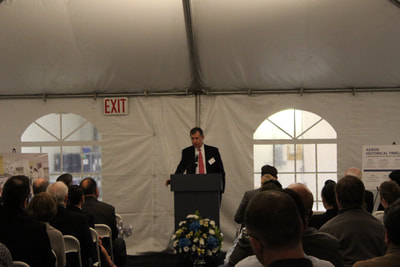
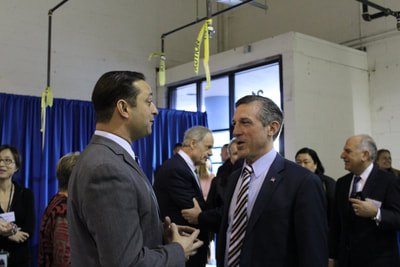
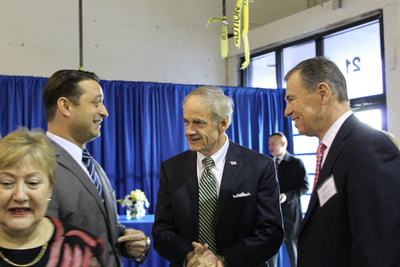
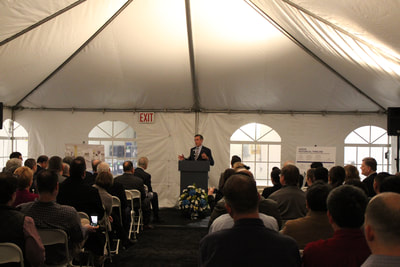
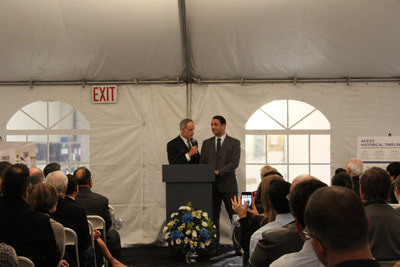
 RSS Feed
RSS Feed